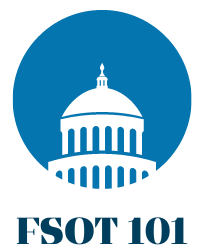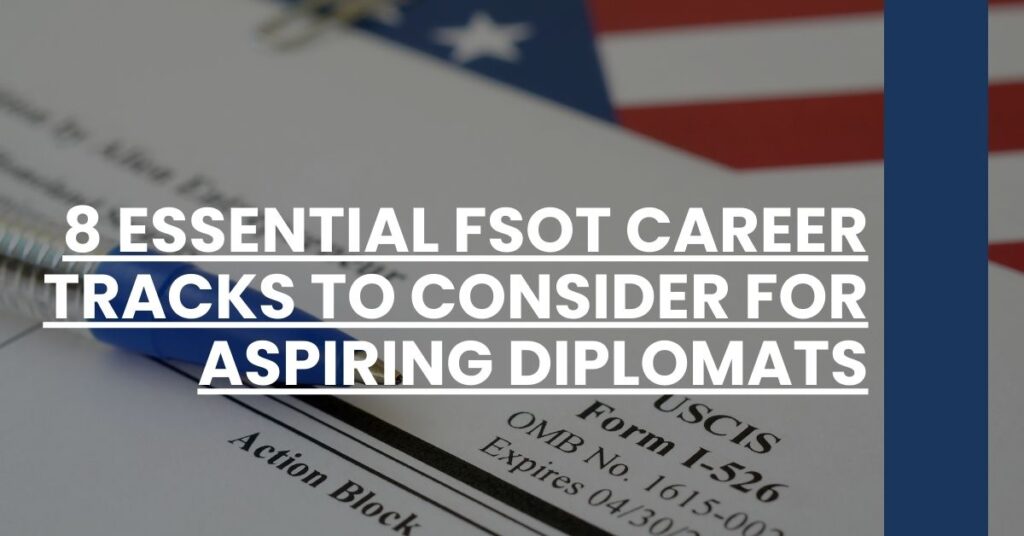Are you eyeing a career as a diplomat but uncertain about the options available? Navigating through the FSOT career tracks to find your perfect match can be as complex as international relations themselves.
Our article maps out the 8 essential Foreign Service Officer paths with keen insights on each, shedding light on their unique impact and roles.
Step past the threshold of “just another government job” and explore careers that shape global diplomacy.
- 1. Consular Officers: Gatekeepers of U.S. Borders
- 2. Economic Officers: Analysts of Global Markets
- 3. Management Officers: Backbone of Diplomatic Missions
- 4. Political Officers: Navigators of Foreign Policy
- 5. Public Diplomacy Officers: Cultivators of U.S. Image Abroad
- 6. Health Diplomacy Officers: Promoters of Global Health
- 7. International Information and Communication Technology Officers: Digital Ambassadors
- The Examination Process: Preparing for the FSOT
- The Foreign Service Officer Test (FSOT)
- The Register: Understanding Your Placement
- Conclusion: Your Journey in Foreign Service
1. Consular Officers: Gatekeepers of U.S. Borders
Within the array of fsot career tracks, Consular Officers uphold a critical function as they are the vigilant guardians of our nation’s borders. If you envision yourself on the frontlines of protecting national security while providing vital services to fellow citizens abroad, this role is tailored for you.
Core Responsibilities:
- Visa processing: Rigorous assessment of visa applications ensures only eligible individuals enter the U.S.
- Citizen services: Aid Americans abroad with passport issues, emergency assistance, and vital records.
- Crisis management: Be the dependable support in dire situations like natural disasters or civil unrest.
To master this multifaceted role, you will immerse yourself in laws and regulations forming the backbone of seamless consular operations. By honing your interpersonal skills, you’ll adeptly navigate complex diplomatic scenarios, ensuring America’s gates open to allies and remain secure from threats.
2. Economic Officers: Analysts of Global Markets
Do you have a keen eye for economic trends and enjoy dissecting trade policies? As an Economic Officer, you become an integral part of the intricate web of global trade, shaping policies that have far-reaching impacts.
In the Field of Economics, You’ll Engage in:
- Economic analysis: Scrutinize market tendencies and forecast implications for U.S. interests.
- Trade advocacy: Champion American exports to bolster economic ties and prosperity.
- Policy development: Craft and advocate policies that advance the national economy on the international stage.
You’ll find yourself straddling the line between detailed economic research and high-stakes negotiation, a balancing act demanding excellence and shrewdness.
3. Management Officers: Backbone of Diplomatic Missions
Imagine being the driving force behind the entire operation of a U.S. Embassy—this is the reality for Management Officers. From human resources to estate management, your ability to lead and oversee operations ensures that diplomacy marches forward.
As a Management Maestro, You Will:
- Oversee logistics: Efficiently coordinate the embassy’s day-to-day functions.
- Lead personnel: Harness the talents of a diverse team.
- Budget management: Allocate financial resources to maximize impact.
Your role transcends traditional office management by integrating strategic diplomacy with the practicalities of running international outposts. Your adept problem-solving ensures America’s diplomatic engine runs smoothly.
4. Political Officers: Navigators of Foreign Policy
Political Officers are the navigators charting the course of U.S. foreign policy. It’s a role that demands astuteness and the ability to build relationships across cultural divides. If analyzing political events and understanding their subtleties excites you, this track suits you perfectly.
Your Crucial Activities Will Include:
- Policy articulation: Convey nuanced U.S. stances to host governments.
- Analytical reporting: Offer insights on political occurrences with potential to influence U.S. policies.
- Diplomatic negotiation: Engage in talks that sculpt international relations.
You will embrace a world where current events directly inform the strategies shaping tomorrow’s political landscape, all while representing American interests abroad.
5. Public Diplomacy Officers: Cultivators of U.S. Image Abroad
Public Diplomacy Officers are the storytellers of American values and policies. In this role, you craft narratives that resonate within foreign nations, fostering mutual understanding and advancing U.S. interests.
Your Creative Portfolio Aims To:
- Strategic communication: Forge campaigns that narrate America’s story compellingly.
- Cultural exchange: Spearhead initiatives that build bridges of cultural appreciation.
- Media engagement: Connect with local and international press to amplify your outreach.
As a strategist and advisor, your influence shapes public attitudes, turning diplomacy into a dialog rather than a monologue. Public Diplomacy Officers ensure that the U.S. maintains a robust and engaging presence on the world’s stage.
6. Health Diplomacy Officers: Promoters of Global Health
As a Health Diplomacy Officer, your mission is clear: to bolster the United States’ efforts in promoting global health initiatives. It’s a position of paramount importance, where your actions directly affect the lives of millions by mitigating health crises and enhancing wellness across nations.
Embark on a Fulfilling Career Path:
- Policy Influence: You’ll be involved in shaping global health diplomacy efforts, tackling issues from infectious disease outbreaks to chronic illness prevention.
- Capacity Building: Your knowledge helps enhance global responses to health emergencies by improving infrastructures and systems.
- Stakeholder Engagement: Connect with international leaders, non-profits, and private sectors to forge alliances in health initiatives.
In this vocational journey, your expertise could be central to preventing the next global pandemic or ensuring that life-saving medicines are distributed fairly. It’s a role not only vital to U.S. interests but humanity at large.
7. International Information and Communication Technology Officers: Digital Ambassadors
As the digital revolution forges ahead, International Information and Communication Technology (ICT) Officers pave the way for safe and advanced technological integration into U.S. diplomatic efforts.
Your Responsibilities Will Drive Progress:
- Ensuring Secure Communications: Safeguard the integrity of digital data channels crucial for national security.
- Promoting Connectivity: Lead initiatives for global digital connectivity, enhancing communication between the U.S. and its partners.
- Advancing Diplomatic Goals: Utilize technology to facilitate and advance U.S. diplomatic objectives.
In your hands lies the power to bridge digital divides and promote open, reliable, and secure internet access globally, making your position more than just an IT role—it’s a cornerstone of modern diplomacy.
The Examination Process: Preparing for the FSOT
Navigating successfully through various FSOT career tracks starts with one pivotal step: preparing for the FSOT itself. The stakes are high, and a thorough preparation strategy is non-negotiable.
Optimize Your Test Preparation:
- Wide-Ranging Study: Immerse yourself in topics from economics to world history to cover the breadth of the exam.
- Practice Tests: Familiarize yourself with the FSOT format and timing to reduce test-day anxiety.
- Quality Materials: Invest in resources that offer comprehensive coverage of potential test content.
Your preparation plays a decisive role in showcasing your skills and knowledge, positioning you for a rewarding career in foreign services.
The Foreign Service Officer Test (FSOT)
The FSOT is your gateway to becoming a Foreign Service Officer. This rigorous examination is designed to whittle down the candidate pool to only the most capable and dedicated individuals.
Understanding the FSOT Structure is Key:
- The test assesses various domains, including job knowledge, situational judgement, and linguistic capabilities.
- A passing score moves you through to the QEP, where your personal narratives are evaluated.
- Regular testing cycles allow candidates the opportunity to retest if necessary.
Solid performance on the FSOT is indicative of your readiness to handle the complexities of a diplomatic career.
The Register: Understanding Your Placement
Upon passing the FSOT and QEP, you find yourself on ‘The Register’—a ranking that serves as the foundation for your career trajectory.
Key Factors Affecting Your Rank:
- Exam Scores: High performance on the FSOT and QEP reviews elevates your rank.
- Preference Points: Veterans or language proficiency can lead to added preference.
- Remaining Active: Engage in professional development and language learning to stay competitive on the Register.
Your position on the Register reflects your qualifications and readiness, determining how quickly you might embark on your diplomatic journey.
Conclusion: Your Journey in Foreign Service
As you contemplate the FSOT career tracks that align with your passion and expertise, remember that each track offers a unique opportunity to serve the nation and impact the world. Your journey in foreign service starts with a commitment to lifelong learning, cultural adaptability, and a desire to represent your country with distinction. With the right preparation and dedication, a rewarding career awaits, full of potential to make a meaningful difference on a global stage. Choose your path, prepare diligently, and embark on an extraordinary voyage in service to the United States and the international community.
Explore FSOT career tracks and learn about diverse roles, from Consular to Political Officers, in U.S. diplomacy services.

